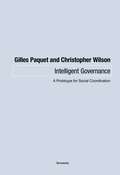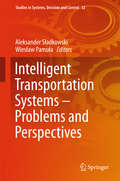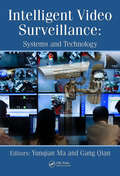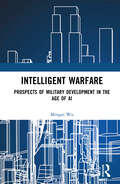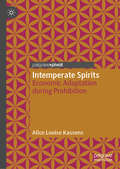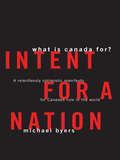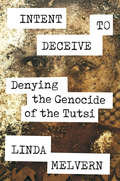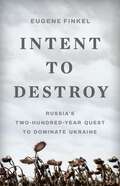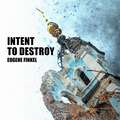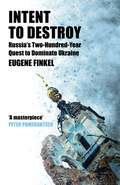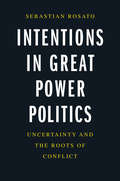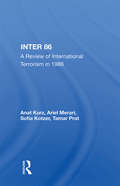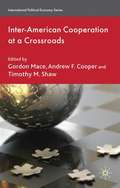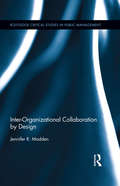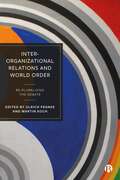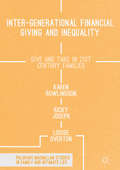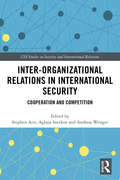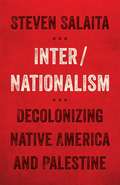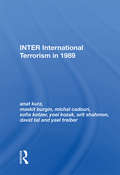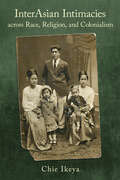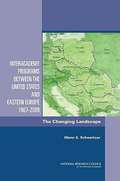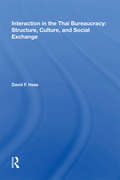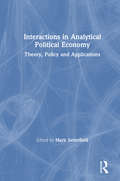- Table View
- List View
Intelligent Governance: A Prototype for Social Coordination
by Christopher Wilson PaquetStriking the right fit between resources, processes, and outcomes in complex environments, where different groups have something to contribute towards joint outcomes, even though they partake in joint operations in the pursuit of their own objectives This is what intelligent governance is all about. It is the practical application of an evolving worldview that is a less conflictive, more intelligent, more cooperative and a wiser mode of human coordination. This short book proposes some guideposts for intelligent governance. It does not put forward a rigid blueprint or a recipe that could mechanically and blindly be followed, but a prototype for a process of inquiry seeking to help organizations find a way forward (through innovation and value adding), some general indications about the most toxic pitfalls likely to materialize mental prisons, lack of mindfulness, etc. and comments about the most promising opportunities or initiatives likely to nudge the coordinating inquiries into successful directions.
Intelligent Transportation Systems - Problems and Perspectives
by Aleksander Sładkowski Wiesław PamułaThis book presents a discussion of problems encountered in the deployment of Intelligent Transport Systems (ITS). It puts emphasis on the early tasks of designing and proofing the concept of integration of technologies in Intelligent Transport Systems. In its first part the book concentrates on the design problems of urban ITS. The second part of the book features case studies representative for the different modes of transport. These are freight transport, rail transport and aerospace transport encompassing also space stations. The book provides ideas for deployment which may be developed by scientists and engineers engaged in the design of Intelligent Transport Systems. It can also be used in the training of specialists, students and post-graduate students in universities and transport high schools.
Intelligent Video Surveillance: Systems and Technology
by Yunqian Ma Gang QianFrom the streets of London to subway stations in New York City, hundreds of thousands of surveillance cameras ubiquitously collect hundreds of thousands of videos, often running 24/7. How can such vast volumes of video data be stored, analyzed, indexed, and searched? How can advanced video analysis and systems autonomously recognize people and
Intelligent Warfare: Prospects of Military Development in the Age of AI
by Mingxi WuThis book examines the future trend toward "intelligent" warfare considering the global environment, the history of warfare, and scientific and technological advancement. It develops a comprehensive set of theoretical frameworks, application concepts, and evaluation criteria for military intelligence.The volume is packed with theoretical highlights and vivid examples, including the tracking of Osama bin Laden, the decapitation strike against Qasem Soleimani, the remote assassination of Iranian nuclear scientists, the drone war in the Nagorno–Karabakh conflict, modern equipment deployed in the Palestinian–Israeli conflict, and the war between social media groups. In addition, the author envisions a possible future for "intelligent" wars in which adversarial parties engage in combat through virtual and unmanned systems. This nature may help avoid the brutality and high death toll associated with traditional warfare.The book explores the possibility of future civilized warfare. It will be of interest to researchers, academics, and students in the fields of politics, military intelligence, and military technology, and to those who are interested in intelligent warfare in general.
Intemperate Spirits: Economic Adaptation during Prohibition
by Alice Louise KassensUsing the basic economic principle of making decisions using a cost-benefit framework—and how changes in one or the other can result in a different decision—this book uncovers how various groups responded to incentives provided by the Prohibition legislation. Using this calculus, it is clear that even criminals are rational characters, responding to incentives and opportunities provided by the 18th Amendment and the Volstead Act. The book begins with a broad look at the adaptations of the law’s targets: the wine, beer, and liquor industries. It then turns to specific people (Violators, Line Tip-Toers, Enablers, and Hypocrites), sharing their stories of economic adaptation to bring economic lessons to life. Due to its structure, the book can be read in parts or as a whole and is suitable for short classroom reading assignments or individual pleasure reading.
Intent For A Nation: What is Canada For
by Michael ByersIn Intent for a Nation, Michael Byers argues that it is time for a clear-eyed appreciation of our strengths and weaknesses, of all we have and all we could be. A whole series of world events-the waning of US credibility; the increasing value of natural resources; the brain-gain; the ever-increasing interdependence of peoples, countries and continents-have combined to put Canada center stage in a new world order. Instead of emulating our increasingly isolated neighbor, we should be advancing the Canadian model, an idealistic, fiscally prudent, socially progressive vision that has never looked so good.Intent for a Nation is a fundamentally optimistic, informed and opinionated overview of where Canada stands in the world and what aggressive public policies are needed to carry the country forward in an ever more competitive and volatile world.Here is a book urging Canadians to rediscover their national self-confidence, to find the courage to dream great dreams-and make them happen.
Intent to Deceive: Denying the Rwandan Genocide
by Linda MelvernA shocking exposé of genocide denialIt is twenty-five years since the 1994 genocide of the Tutsi of Rwanda when in the course of three terrible months more than 1 million people were murdered. In the intervening years a pernicious campaign has been waged by the perpetrators to deny this crime, with attempts to falsify history and blame the victims for their fate. Facts are reversed, fake news promulgated, and phoney science given credence. Intent to Deceive tells the story of this campaign of genocide denial from its origins with those who planned the massacres. With unprecedented access to government archives including in Rwanda Linda Melvern explains how, from the moment the killers seized the power of the state, they determined to distort reality of events. Disinformation was an integral part of their genocidal conspiracy. The génocidaires and their supporters continue to peddle falsehoods. These masters of deceit have found new and receptive audiences, have fooled gullible journalists and unwary academics. With their seemingly sound research methods, the Rwandan génocidaires continue to pose a threat, especially to those who might not be aware of the true nature of their crime. The book is a testament to the survivors who still live the horrors of the past. Denial causes them the gravest offence and ensures that the crime continues. This is a call for justice that remains perpetually delayed.
Intent to Destroy: Russia's Two-Hundred-Year Quest to Dominate Ukraine
by Eugene FinkelWritten with &“erudition and verve&” (Timothy Snyder, New York Times-bestselling author of On Tyranny), this is the full story of how and why Russia has tried to violently subjugate Ukraine across the centuries, and how Ukrainians have resisted Russia&’s brutal invasion of Ukraine in February 2022 shocked the world. And yet, to Ukrainians, this attack was painfully familiar, the latest episode in a centuries-long Russian campaign to divide and oppress Ukraine. In Intent to Destroy, political scientist Eugene Finkel uncovers these deep roots of the Russo-Ukrainian War. Ukraine is a key borderland between Russia and the West, and, following the rise of Russian nationalism in the nineteenth century, dominating Ukraine became the cornerstone of Russian policy. Russia has long used genocidal tactics—killings, deportations, starvation, and cultural destruction—to successfully crush Ukrainian efforts to chart an independent path. As Finkel shows, today&’s violence is simply a more extreme version of the Kremlin&’s long-standing policy. But unlike in the past, the people of Ukraine—motivated by the rise of democracy in their nation—have overcome their deep internal divisions. For the first time, they have united in favor of independence from Russia. Whatever the outcome of the present war, Ukraine&’s staunch resistance has permanently altered its relationship to Russia and the West. Intent to Destroy offers the vital context we need to truly understand Europe&’s bloodiest conflict since World War II.
Intent to Destroy: Russia's Two-Hundred-Year Quest to Dominate Ukraine
by Eugene Finkel'The must read masterpiece . . . utterly essential' PETER POMERANTSEV'With erudition and verve' TIMOTHY SNYDER'Powerful' SERHII PLOKHY'Masterful' BEN ANSELLA history of Russian violence waged against Ukraine across the centuries. Russia's brutal invasion of Ukraine in February 2022 shocked the world. And yet this attack was in fact the latest episode in a centuries-long Russian campaign. In Intent to Destroy, leading scholar of genocide and Eastern Europe Eugene Finkel uncovers the deep roots of the Russo-Ukrainian War. Ever since the rise of Russian nationalism in the nineteenth century, the domination of this key borderland has become a cornerstone of Russian and Soviet policy. Using genocidal tactics - killings, deportations, starvation and cultural destruction - against ethnic Ukrainians and minorities including Tatars, Jews and Poles, Russia's long-standing policy has aimed to obliterate Ukrainian identity. This eradication has consistently been a part of the Kremlin playbook and leads inexorably to the violence we see today. Told with the astonishing power of Finkel's connection to this living history, and the authority of two decades of research, Intent to Destroy casts today's war it its broadest historical context, illuminating as never before Europe's bloodiest conflict since World War II.
Intent to Destroy: Russia's Two-Hundred-Year Quest to Dominate Ukraine
by Eugene Finkel'The must read masterpiece . . . utterly essential' PETER POMERANTSEV'With erudition and verve' TIMOTHY SNYDER'Powerful' SERHII PLOKHY'Masterful' BEN ANSELLA history of Russian violence waged against Ukraine across the centuries. Russia's brutal invasion of Ukraine in February 2022 shocked the world. And yet this attack was in fact the latest episode in a centuries-long Russian campaign. In Intent to Destroy, leading scholar of genocide and Eastern Europe Eugene Finkel uncovers the deep roots of the Russo-Ukrainian War. Ever since the rise of Russian nationalism in the nineteenth century, the domination of this key borderland has become a cornerstone of Russian and Soviet policy. Using genocidal tactics - killings, deportations, starvation and cultural destruction - against ethnic Ukrainians and minorities including Tatars, Jews and Poles, Russia's long-standing policy has aimed to obliterate Ukrainian identity. This eradication has consistently been a part of the Kremlin playbook and leads inexorably to the violence we see today. Told with the astonishing power of Finkel's connection to this living history, and the authority of two decades of research, Intent to Destroy casts today's war it its broadest historical context, illuminating as never before Europe's bloodiest conflict since World War II.
Intent to Destroy: Russia's Two-Hundred-Year Quest to Dominate Ukraine
by Eugene Finkel'The must read masterpiece . . . utterly essential' PETER POMERANTSEV'With erudition and verve' TIMOTHY SNYDER'Powerful' SERHII PLOKHY'Masterful' BEN ANSELLA history of Russian violence waged against Ukraine across the centuries. Russia's brutal invasion of Ukraine in February 2022 shocked the world. And yet this attack was in fact the latest episode in a centuries-long Russian campaign. In Intent to Destroy, leading scholar of genocide and Eastern Europe Eugene Finkel uncovers the deep roots of the Russo-Ukrainian War. Ever since the rise of Russian nationalism in the nineteenth century, the domination of this key borderland has become a cornerstone of Russian and Soviet policy. Using genocidal tactics - killings, deportations, starvation and cultural destruction - against ethnic Ukrainians and minorities including Tatars, Jews and Poles, Russia's long-standing policy has aimed to obliterate Ukrainian identity. This eradication has consistently been a part of the Kremlin playbook and leads inexorably to the violence we see today. Told with the astonishing power of Finkel's connection to this living history, and the authority of two decades of research, Intent to Destroy casts today's war it its broadest historical context, illuminating as never before Europe's bloodiest conflict since World War II.
Intentions in Great Power Politics: Uncertainty and the Roots of Conflict
by Sebastian RosatoWhy the future of great power politics is likely to resemble its dismal past Can great powers be confident that their peers have benign intentions? States that trust each other can live at peace; those that mistrust each other are doomed to compete for arms and allies and may even go to war. Sebastian Rosato explains that states routinely lack the kind of information they need to be convinced that their rivals mean them no harm. Even in cases that supposedly involved mutual trust—Germany and Russia in the Bismarck era; Britain and the United States during the great rapprochement; France and Germany, and Japan and the United States in the early interwar period; and the Soviet Union and United States at the end of the Cold War—the protagonists mistrusted each other and struggled for advantage. Rosato argues that the ramifications of his argument for U.S.–China relations are profound: the future of great power politics is likely to resemble its dismal past.
Inter 86: A Review Of International Terrorism In 1986
by Anat KurzThis survey delineates various aspects of and major issues in international terrorism in 1986, focusing on western states' policies on terrorism and the use of and support for terrorism by Middle Eastern states. It also presents an analysis of trends in Palestinian terrorism.
Inter-American Cooperation at a Crossroads
by Timothy M. Shaw Gordon Mace Andrew F. CooperFifteen years after the first Summit of the Americas, the world and the Americas have changed enormously. Competing strategies for economic development and political representation have shattered the hemispheric consensus of the 1990s. This book analyzes these developments and points towards a future for inter-American co-operation.
Inter-Organizational Collaboration by Design (Routledge Critical Studies in Public Management)
by Jennifer MaddenAlthough difficult, complicated, and sometimes discouraging, collaboration is recognized as a viable approach for addressing uncertain, complex and wicked problems. Collaborations can attract resources, increase efficiency, and facilitate visions of mutual benefit that can ignite common desires of partners to work across and within sectors. An important question remains: How to enable successful collaboration? Inter-Organizational Collaboration by Design examines how these types of collaborations can overcome barriers to innovate and rejuvenate communities outlining the factors and antecedents that influence successful collaboration. The book proposes a theoretical perspective for collaborators to adopt design science (a solution finding approach utilizing end-user-centered research, prototyping, and collective creativity to strengthen individuals, teams, and organizations), the language of designers, and a design attitude as an empirically informed pathway for better managing the complexities inherent in collaboration. Through an integrated framework, evidence-based tools and strategies for building successful collaboration is articulated where successful collaboration performance facilitates innovation and rejuvenation. This volume will be essential reading for academics, researchers, leaders and managers in nonprofit, private, and government sectors interested in building better collaborations.
Inter-Organizational Relations and World Order: Re-Pluralizing the Debate
by David Brewster Ulrich Franke and Martin KochWithin international relations scholarship, the nature of international organizations and their relationship with each other and nation-states has been widely contested. This edited volume brings together a team of experts to shed new light on inter-organizational relations in world politics. The book covers areas from the rule of law and international security to business and sport. Through its analysis, it demonstrates that, just as inter-organizational relations themselves are diverse and complex, research on this topic should also be pluralistic in order to draw new and valuable results and insights.
Inter-generational Financial Giving and Inequality
by Karen Rowlingson Ricky Joseph Louise OvertonThis book makes a major contribution to our understanding of 21st Century families in Britain through an exploration of intergenerational relationships. Drawing on new and extensive quantitative and qualitative research, the authors explore the giving and receiving of financial gifts. Despite growing concern about intergenerational tension and even possible conflict, the book finds evidence of a significant degree of intergenerational solidarity both within families at the micro level and between generations more generally within society (at the macro level) in Britain. However, given substantial inequalities within different generations- as a result, in particular, of social class divisions- some families are able to support each other far more than others. This means that strong intergenerational solidarity may lead to the entrenchment of existing intragenerational inequalities. The book will be of interest to scholars and students researching Sociology, Social Policy, Family Sociology, Generations and Intergenerational Relationships.
Inter-organizational Relations in International Security: Cooperation and Competition (CSS Studies in Security and International Relations)
by Andreas Wenger Stephen Aris Aglaya SnetkovThis book examines the politics of the relationships between multilateral organizations that have come to play a major role in contemporary efforts to manage international security. Drawing on concepts developed in Organizational Studies, the book starts from the assumption that inter-organizational relationships are the product of contested politics. Politics that may be either more cooperative or more competitive, but which always contains elements of both. This volume focuses on inter-organizational relations emanating from, through and towards the regional scale. The proliferation in the number of regional multilateral organizations in recent decades and their growing claims to represent effective and legitimate frameworks to address security threats and issues has been widely noted. The book is organized into four sections, covering all aspects of the inter-organizational relationships in which regional multilateral organizations are involved: global-regional, intra-regional, inter-regional, and multi-scalar. Each chapter addresses a distinct case study of inter-organizational relations (bilateral, trilateral or wider network), and examines the politics shaping these relations. This book will be of much interest to students of international security, international organizations, global governance and area studies, more generally.
Inter/Nationalism: Decolonizing Native America and Palestine (Indigenous Americas)
by Steven Salaita&“The age of transnational humanities has arrived.&” According to Steven Salaita, the seemingly disparate fields of Palestinian Studses and American Indian studies have more in common than one may think. In Inter/Nationalism, Salaita argues that American Indian and Indigenous studies must be more central to the scholarship and activism focusing on Palestine. Salaita offers a fascinating inside account of the Boycott, Divestment, and Sanctions (BDS) movement—which, among other things, aims to end Israel&’s occupation of Palestinian land. In doing so, he emphasizes BDS&’s significant potential as an organizing entity as well as its importance in the creation of intellectual and political communities that put Natives and other colonized peoples such as Palestinians into conversation. His discussion includes readings of a wide range of Native poetry that invokes Palestine as a theme or symbol; the speeches of U.S. President Andrew Jackson and early Zionist thinker Ze&’ev Jabotinsky; and the discourses of &“shared values&” between the United States and Israel. Inter/Nationalism seeks to lay conceptual ground between American Indian and Indigenous studies and Palestinian studies through concepts of settler colonialism, indigeneity, and state violence. By establishing Palestine as an indigenous nation under colonial occupation, this book draws crucial connections between the scholarship and activism of Indigenous America and Palestine.
Inter: International Terrorism In 1989
by Anat KurzThis annual publication contains statistical data on international terrorism in 1989, as well as brief analyses of key terrorism-related issues. Extensive tables are accompanied by a chronology of significant international terrorist events in 1989 and a glossary of terrorist organizations.
InterAsian Intimacies across Race, Religion, and Colonialism
by Chie IkeyaIn InterAsian Intimacies across Race, Religion, and Colonialism, Chie Ikeya asks how interAsian marriage, conversion, and collaboration in Burma under British colonial rule became the subject of political agitation, legislative activism, and collective violence. Over the course of the twentieth century relations between Burmese Muslims, Sino-Burmese, Indo-Burmese, and other mixed families and communities became flashpoints for far-reaching legal reforms and Buddhist revivalist, feminist, and nationalist campaigns aimed at consigning minority Asians to subordinate status and regulating women's conjugal and reproductive choices. Out of these efforts emerged understandings of religion, race, and nation that continue to vex Burma and its neighbors today.Combining multilingual archival research with family history and intergenerational storytelling, Ikeya highlights how the people targeted by such movements made and remade their lives under the shifting circumstances of colonialism, capitalism, and nationalism. The book illuminates a history of belonging across boundaries, a history that has been overshadowed by Eurocentric narratives about the mixing of white colonial masters and native mistresses. InterAsian intimacy was—and remains—foundational to modern regimes of knowledge, power, and desire throughout Asia.
Interacademy Programs between the United States and Eastern Europe 1967-2009: The Changing Landscape
by National Research Council of the National AcademiesInteracademy Programs Between the United States and Eastern Europe 1967-2009 documents how interacademy programs have played a significant role in establishing and maintaining American scientific contacts with colleagues in Eastern Europe prior to and following the lifting of the Iron Curtain. The book also discusses the changing roles of the academies of the region and the changing nature of interacademy cooperation that has emerged since 1991. The countries of interest are Poland, the Czech Republic, Slovakia, Hungary, Romania, Bulgaria, the former German Democratic Republic, and the countries that previously were united politically within the framework of the former Yugoslavia. The book should be of interest to officials and specialists in both the United States and the countries of Eastern Europe who are actively engaged in promoting scientific cooperation through bilateral and other channels. Also, an emerging audience for this book is the growing group of analysts in the United States interested in "science diplomacy" involving U.S. cooperation with countries that have political agendas that differ in important respects from the objectives of U.S. policies.
Interaction In The Thai Bureaucracy: Structure, Culture, And Social Exchange
by David F. HaasPresenting the results of seventeen months of field research, conducted entirely in the Thai language, this study describes and compares the patterns of social exchange of two groups of Thai officials: district-level bureaucrats and physicians in a provincial hospital. Dr. Haas uses a unique combination of anthropological field data and survey rese
Interactional Competences in Institutional Settings
by Laurent Filliettaz Simona Pekarek Doehler Adrian Bangerter Geneviève De Weck Esther González-Martínez Cécile PetitjeanThis interdisciplinary volume brings together leading scholars from several disciplines to uncover the key to young people's socialization within institutional settings, from school to the workplace. Among the questions they consider are: what aspects of interactional competence are relevant for participation in practical activities within those settings? What are the interactional procedures through which diverse facets of interactional competence are recognized, legitimized and assessed in the course of practical activities? How do these procedures shape and reflect social institutions and people's understanding of them? The collection discusses interactional competences across a variety of institutional settings, and reflects on the institutional order by scrutinizing how such competences are interactionally treated within everyday institutional practices. The volume enriches an interdisciplinary understanding of fundamental concepts in the social sciences and will therefore be of interest to those working within linguistics, sociology, education, psychology of work, and speech therapy.
Interactions in Analytical Political Economy: Theory, Policy, and Applications
by Mark SetterfieldIn this interactive collection of essays, many of the leading proponents of analytical political economy examine major macroeconomic issues through the integration of mathematical analysis and non-neoclassical economic theory. The topics covered include the macroeconomics of the labor market, open economy issues, economic growth, and macroeconomic policy. The chapter-comment-reply format of the book creates a genuine dialogue on each theme, and evokes a sense of unfolding debate which draws the reader into the discussion.
